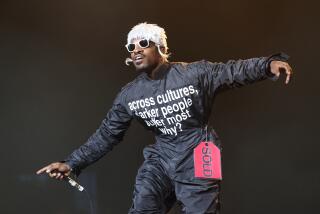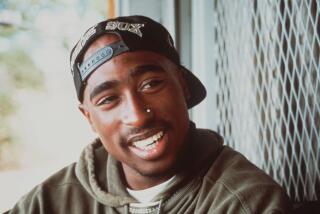RAP IN PEACE
- Share via
Five years after his violent death, rapper Tupac Shakur is headed back to the national sales charts.
Posthumous collections are normally viewed with skepticism in the pop world, but three albums of new material by the late rapper have already returned him to the charts since he was killed in Las Vegas in 1996 by unknown assailants.
Those albums--1996’s “The Don Killuminati: The 7 Day Theory,” 1997’s “R U Still Down? [Remember Me]” and 1999’s “Still I Rise”--were far more than the ghoulish curiosities that record companies often release after a star’s death. They were solid works that reflected the venom and insights that made Shakur, who billed himself as 2Pac on record, one of the most influential and prolific figures ever in rap.
All three reached the national Top 10 and have sold almost 7 million copies collectively. A “Greatest Hits” album in 1998 also broke into the Top 10 and sold an additional 3.3 million copies.
Erik Parker, music editor of the hip-hop magazine the Source, expects the new collection, a two-disc package titled “Until the End of Time” and due in stores March 27, to be a top seller.
“Even after his death, Tupac is as powerful as he was when he was living,” says Parker. “To this day, no one has taken his place in his fans’ eyes, because his posthumous albums have upheld the quality of his earlier albums.”
The new release should meet the high expectations, thus adding to his growing legacy. The music was recorded around the same time as “The Don Killuminati,” an album whose raps about being killed led to a groundswell of conspiracy theories after his slaying.
His reflections on death continue on the new album with a track titled “Ballad of a Dead Soul.” But there are also tender moments, including touching songs addressing the children Shakur hoped to have someday. This ability to both provoke and soothe is one reason his music continues to connect with audiences. And there’s more to come: Another double album is scheduled to arrive in November, drawn from the estimated 150 tracks he left unreleased.
“As long as he has music left, there will be another [album] out,” says Shakur’s mother, Afeni Shakur, who shares executive producer billing on “Until the End of Time” with imprisoned Death Row Records CEO Suge Knight. Shakur was signed to the Death Row label at the time of his death. The new album will be released on Amaru Entertainment Records, which is owned by the rapper’s mother, in association with Death Row and Interscope.
“We’re trying to release his music in a timely manner,” Shakur says. “What matters is that there was an artist who produced this much quality material [by the time he was] 25. It’s kind of nice just to marvel and sit and look at that.”
Fans will also probably marvel at the quality of the material.
Like much of the music he recorded shortly before his death, the beats here are smooth, uncluttered and often upbeat. The tracks were enhanced by a number of producers, giving the recording a contemporary feel.
Even though many of today’s most popular rappers focus on themes of lavish living and their ruthless natures, Shakur’s work often dealt with struggle, pain, insecurity and bitterness on a more realistic, human level. That allowed his music to strike many listeners on an intensely personal level.
But he also reeled in fans with his more rancid raps. For every instance of self-doubt Shakur offered, there seemed to be a fit of rage in which he would lash out at everyone from the government to rival rappers.
“When you’re a writer who deals with reflections of reality, your work will last forever,” says Big Hutch, one of the musical supervisors on “Until the End of Time.”
“What separates the good from the great is when you’re able to talk about real, heavy stuff and still entertain. There’s only a few that can do that--the Bob Marleys, the 2Pacs, the KRS-Ones.”
Afeni Shakur echoes Hutch’s sentiment. “I think that Tupac was the trendsetter, the high mark,” she says. “What we hope his music will continue to do is to at least encourage people away from mediocrity, because he was not a mediocre artist. When he was alive, people competed. There was a lot of competition, and a lot of the artists were better for it.”
More to Read
The biggest entertainment stories
Get our big stories about Hollywood, film, television, music, arts, culture and more right in your inbox as soon as they publish.
You may occasionally receive promotional content from the Los Angeles Times.









